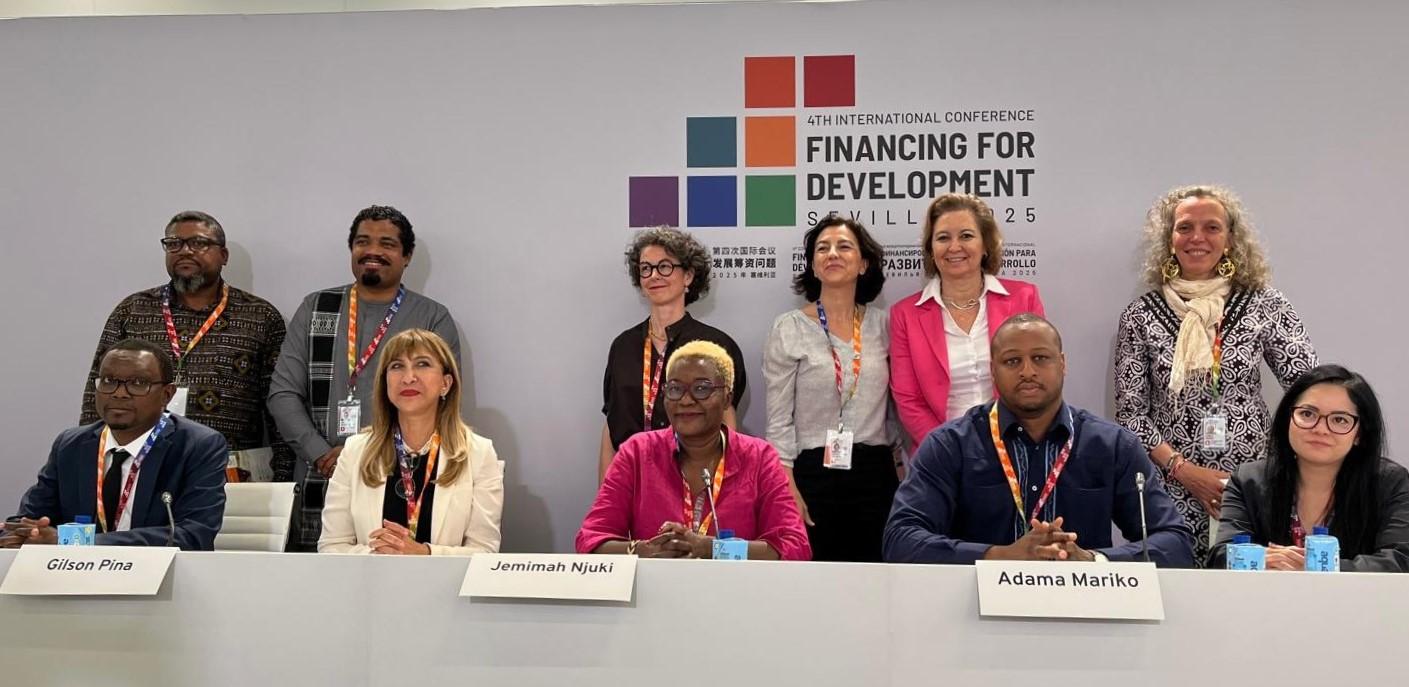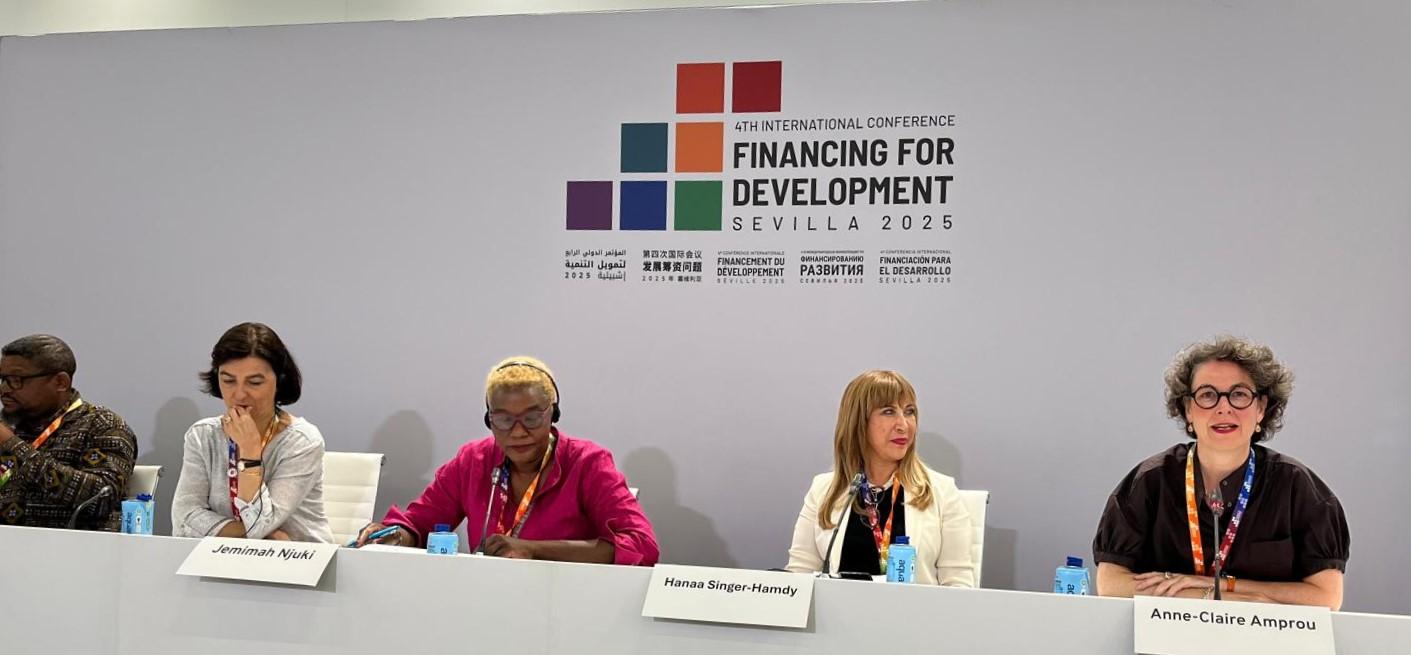Sevilla - The governments of France and Senegal, along with the Global Accelerator participating agencies (ILO, UNICEF, UNDP, FAO, WFP and UN WOMEN) and the Joint SDG Fund, co-hosted the “Leveraging Social Investments: Financing for Jobs & Social Protection” side event at the 4th International Conference on Financing for Development (FFD4) in Sevilla, Spain on 3 July. The world is grappling with overlapping crises—from climate shocks to widening inequality and fiscal strain. The event brought together governments, employers, workers, and development partners to underscore the importance of investing in decent jobs and social protection to drive growth, resilience, and long-term development.

Nearly 3.8 billion people around the world still lack any form of social protection; 2 billion workers are employed in the informal economy. Valérie Schmitt, Deputy Director, Universal Social Protection Department, ILO, introduced the Global Accelerator’s ambition and how the initiative is helping ignite a virtuous cycle of development in the 18 pathfinder countries of the initiative by linking jobs, social protection and financing. “For many low-income and lower-middle-income countries, the fiscal space is shrinking, and debt burdens make it difficult to invest in transformative policies. Integrated policies that tackle informality, poverty, inequality, and skills deficits are helping leverage more financing for countries to improve jobs and social protection outcomes.”
Senegal provided a concrete illustration of how the Global Accelerator works on the ground. Souleymane Diallo, Director General - Planning and Economic Policy, Ministry of Economy, Planning and Cooperation, Senegal, explained that the Global Accelerator brings together relevant ministries, social partners, UN and IFIs to support the implementation of priority policies and investments. Using the ILO Tool ‘Structural Model for Sustainable Development’, Senegal will systematically include social protection and decent jobs in all its investments, whether in agriculture or other sectors, and try to maximize their social impact. Similarly, Gilson Pina, National Director for Planning, Ministry of Finance, Cabo Verde, presented the Global Accelerator as a mechanism that brings together the social and economic agendas.

The technical insights and high-level dialogue, facilitated by Jemimah Njuki, Chief - Economic Empowerment Section, UN Women, centred on how the Global Accelerator creates a convincing narrative for governments, the private sector and International Financial Institutions (IFIs) to invest more in national social protection systems and employment programmes, facilitating access to decent jobs and income security, and enhancing social coherence, stability, and resilience. Adama Mariko, Secretary General of Finance in Common and Deputy Director for Mobilization, Partnerships and Communication at Agence Française de Développement (AFD) stressed that the cost of inaction, by not making necessary investments in health, education and social protection, can be higher than the cost of infrastructure investments that public development banks are supporting. He emphasized that AFD is supporting just transitions in countries such as South Africa, through comprehensive programmes including social protection, green jobs and skills development.
Spain’s State Secretary for International Cooperation, Eva Granados, stressed the importance of the Global Accelerator for the implementation of just transitions which is one key priority of Spanish development cooperation. She also mentioned that Spain’s support to the Global Accelerator includes bringing together the UN and the World Bank to increase coherence between technical and financial assistance on social protection and employment. From Sevilla to Doha, the Global Accelerator is an important mechanism in supporting the extension of social protection coverage by 2 percentage points per year in as many countries as possible.
The event showcased how country-led platforms that involve ministries of economy, finance, labour and social affairs, as well as social partners and civil society, IFIs and the UN, when combined with multilateral cooperation and innovative financing mechanisms, can support systemic reform and long-term resilience while promoting democratic and participatory governance. Both Mahongora Kavihuha, Secretary General, Trade Union Congress of Namibia, and Akustina Morni, Director of Policy, International Organisation of Employers, stressed the key role of workers and employers for social protection design and financing, and the creation of decent jobs, emphasizing that involving them at country level is key to achieve results on the ground. Hanaa Singer-Hamdy, UN Resident Coordinator, Nepal, provided convincing evidence of the role of the Global Accelerator in supporting not only the extension of public spending on social protection and employment, but also in maximising its impact on people. She described the Global Accelerator as a platform to get the best from each entity, from the government on one hand and the UN and the World Bank on the other. Finally, Anne-Claire Amprou, Global Health Ambassador of France, stressed the importance of social protection as the foundation of societies and as an investment with high economic and social returns, presenting the Global Accelerator as a mechanism which brings coherence and unites different stakeholders around a common objective.
“The discussion reaffirmed that we have the tools, partnerships, and evidence to scale up action. What we need now is sustained commitment—to financing that puts social justice at the heart of economic planning,” said Laura Thompson, Assistant Director-General, ILO in her closing remarks. “We need more partnerships, more political commitment, and smarter financing strategies to make just transitions a reality.”
Read the full submission of the GA-M-GA for the FFD4 SPA initiative here.
The Global Accelerator is part of the Sevilla Action Platform
It can help implement some of the global FFD4 commitments:
- The Global Accelerator fosters UN/IFI collaboration through its M-GA partnership with the World Bank and collaboration with (§7 of the outcome document).
- Through country-led national coordination platforms (§ 41) and national acceleration roadmaps, it helps align international support to national financing and policy priorities on decent jobs and universal social protection (§8 of the outcome document).
- The Global Accelerator supports integrated/coordinated policy and financing to create decent jobs, expand social protection and facilitate the transition to the formal economy (§21 - §27 - §54).
- It promotes democratic and participatory governance (§13) through its Global Steering Group and national tripartite committees that bring together national governments of pathfinder countries, social partners, donors, UN, IFIs and civil society.
- The Global Accelerator supports increased Domestic Resource Mobilization (DRM) (§26) supported by international cooperation, social bonds (§32), and channels resources for technical assistance through a multi-donor and interagency fund called the Joint SDG Fund (§39).